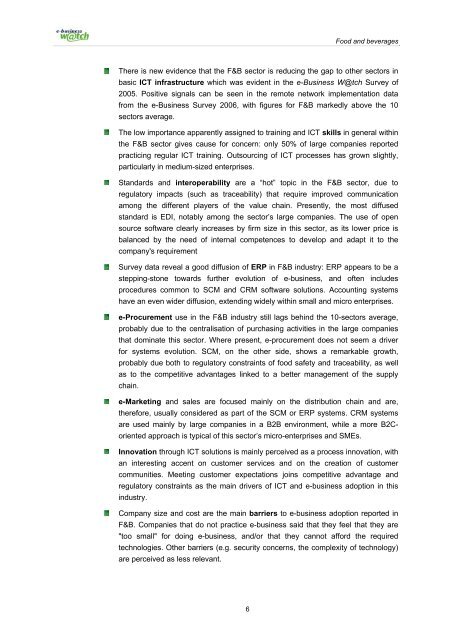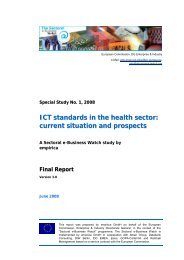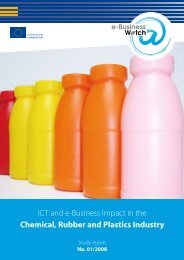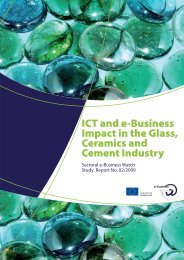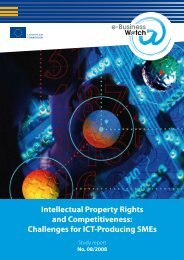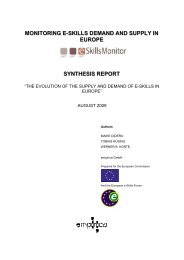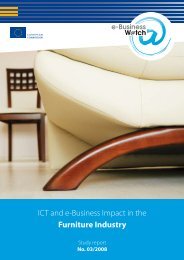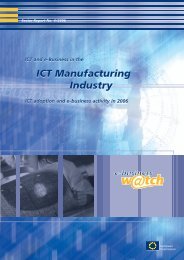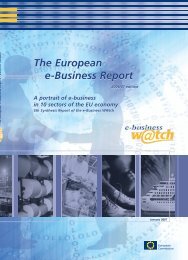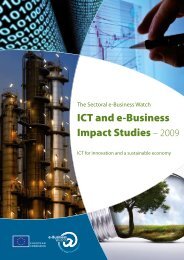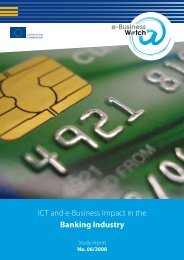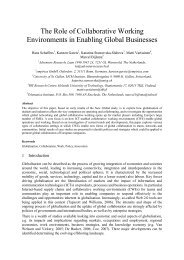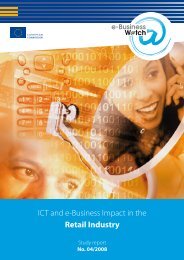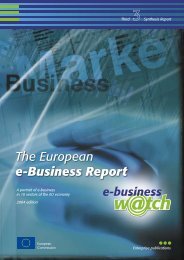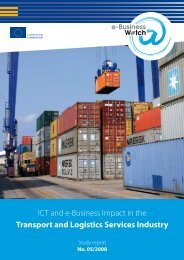ICT And e-Business In The Food And - empirica
ICT And e-Business In The Food And - empirica
ICT And e-Business In The Food And - empirica
Create successful ePaper yourself
Turn your PDF publications into a flip-book with our unique Google optimized e-Paper software.
<strong>Food</strong> and beverages<strong>The</strong>re is new evidence that the F&B sector is reducing the gap to other sectors inbasic <strong>ICT</strong> infrastructure which was evident in the e-<strong>Business</strong> W@tch Survey of2005. Positive signals can be seen in the remote network implementation datafrom the e-<strong>Business</strong> Survey 2006, with figures for F&B markedly above the 10sectors average.<strong>The</strong> low importance apparently assigned to training and <strong>ICT</strong> skills in general withinthe F&B sector gives cause for concern: only 50% of large companies reportedpracticing regular <strong>ICT</strong> training. Outsourcing of <strong>ICT</strong> processes has grown slightly,particularly in medium-sized enterprises.Standards and interoperability are a “hot” topic in the F&B sector, due toregulatory impacts (such as traceability) that require improved communicationamong the different players of the value chain. Presently, the most diffusedstandard is EDI, notably among the sector’s large companies. <strong>The</strong> use of opensource software clearly increases by firm size in this sector, as its lower price isbalanced by the need of internal competences to develop and adapt it to thecompany's requirementSurvey data reveal a good diffusion of ERP in F&B industry: ERP appears to be astepping-stone towards further evolution of e-business, and often includesprocedures common to SCM and CRM software solutions. Accounting systemshave an even wider diffusion, extending widely within small and micro enterprises.e-Procurement use in the F&B industry still lags behind the 10-sectors average,probably due to the centralisation of purchasing activities in the large companiesthat dominate this sector. Where present, e-procurement does not seem a driverfor systems evolution. SCM, on the other side, shows a remarkable growth,probably due both to regulatory constraints of food safety and traceability, as wellas to the competitive advantages linked to a better management of the supplychain.e-Marketing and sales are focused mainly on the distribution chain and are,therefore, usually considered as part of the SCM or ERP systems. CRM systemsare used mainly by large companies in a B2B environment, while a more B2Corientedapproach is typical of this sector’s micro-enterprises and SMEs.<strong>In</strong>novation through <strong>ICT</strong> solutions is mainly perceived as a process innovation, withan interesting accent on customer services and on the creation of customercommunities. Meeting customer expectations joins competitive advantage andregulatory constraints as the main drivers of <strong>ICT</strong> and e-business adoption in thisindustry.Company size and cost are the main barriers to e-business adoption reported inF&B. Companies that do not practice e-business said that they feel that they are"too small" for doing e-business, and/or that they cannot afford the requiredtechnologies. Other barriers (e.g. security concerns, the complexity of technology)are perceived as less relevant.6


